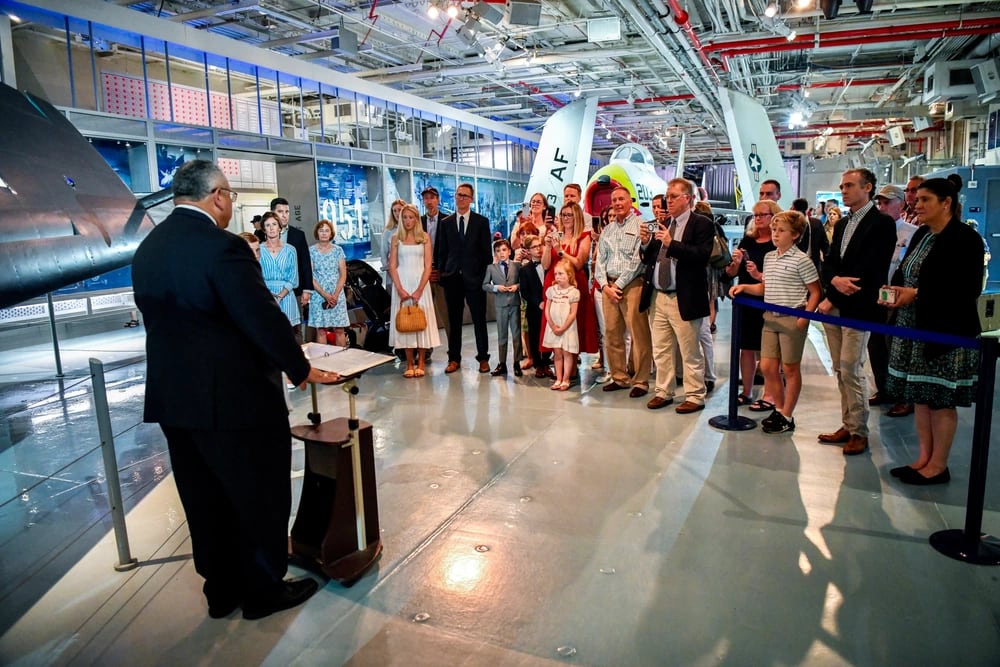During World War II, Navy Aviation Radioman 3rd Class Peter L. Smith doggedly helped battle the Japanese from the Solomon Islands to Okinawa. Thanks in part to the unflagging efforts of his son, the sailor’s efforts to help win the war in the Pacific have finally been recognized.
During an Aug. 16 ceremony aboard the Intrepid Sea, Air & Space Museum in New York City, Secretary of the Navy Carlos Del Toro posthumously awarded Smith the Distinguished Flying Cross, for outstanding achievement in aerial flight, and the Air Medal.
His son, James, accepted the medals on his father’s behalf.
“My father, like many thousands of his generation during the war, did his job — day in and day out,” Smith said, according to a Navy release.
His dad, a native of Troy, New York, enlisted in the Navy in February 1942, just two months after the attack on Pearl Harbor. He initially served as a storekeeper, but soon volunteered for flying duty and completed training as an aviation radioman and an air gunner, according to the release.
In June 1943, Smith was assigned to VC-28, a composite squadron operating out of Henderson Field on Guadalcanal. During that time, he was part of a three-man crew manning a TBF Avenger torpedo bomber and participated in 15 combat missions supporting ground troops at New Georgia in the Solomon Islands.
He was then reassigned to Torpedo Squadron 28, a carrier-based squadron embarked with the light aircraft carrier Monterey in 1944.
“During his time with VT-28, Smith flew in operations to retake the Marianas, Saipan, Tinian and Southern Palau from Japanese forces,” according to the release. “He also supported the assaults on the Philippines and strikes against Okinawa.”
In all, Smith helped carry out more than 150 combat and support missions with Torpedo Squadron 28.
After the war, Smith hung up his Navy uniform returned home to work for the New York State Department of Labor. He died in 2009, according to his obituary on Legacy.com.

During the ceremony aboard the Intrepid, Del Toro thanked James Smith for “his tireless work to ensure his father received the recognition he deserved and for preserving his father’s story of service during World War II.”
“I am humbled by the opportunity to honor Peter L. Smith — one of our Navy’s hundreds of thousands of World War II veterans — for his service to our nation during a defining period in world history,” Del Toro said, according to the release. “After the war, Smith, like so many members of this greatest generation, returned to their civilian careers, but forever remained proud of their service.”
“To Petty Officer Smith’s family, I am confident there is no doubt in your minds that his actions met the criteria above for these two awards,” Del Toro said. “His devotion to duty in support of his fellow sailors, Marines, airmen and soldiers was indeed unwavering throughout his time in service, and I have no doubt you take pride in his accomplishments to keep our nation free.”
U.S. Army Corps reservist Capt. Charles Lindbergh received the very first Distinguished Flying Cross in June 1927 for his nonstop, solo flight across the Atlantic. Other notable recipients of the award include former President George H.W. Bush and former Sen. John S. McCain of Arizona.
Those eligible for the award are Navy, Marine Corps and Coast Guard personnel who “distinguish themselves for heroism or outstanding achievement while participating in aerial flight” for the U.S. Armed Forces, according to the U.S. Naval History and Heritage Command.




